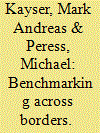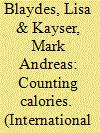| Srl | Item |
| 1 |
ID:
121136


|
|
|
|
|
| Publication |
2012.
|
| Summary/Abstract |
When the economy in a single country contracts, voters often punish the government. When many economies contract, voters turn against their governments much less frequently. This suggests that the international context matters for the domestic vote, yet most research on electoral accountability assumes that voters treat their national economies as autarkic. We decompose two key economic aggregates-growth in real gross domestic product and unemployment-into their international and domestic components and demonstrate that voters hold incumbents more electorally accountable for the domestic than for the international component of growth. Voters in a wide variety of democracies benchmark national economic growth against that abroad, punishing (rewarding) incumbents for national outcomes that underperform (outperform) an international comparison. Tests suggest that this effect arises not from highly informed voters making direct comparisons but from "pre-benchmarking" by the media when reporting on the economy. The effect of benchmarked growth exceeds that of aggregate national growth by up to a factor of two and outstrips the international component of growth by an even larger margin, implying that previous research may have underestimated the strength of the economy on the vote.
|
|
|
|
|
|
|
|
|
|
|
|
|
|
|
|
| 2 |
ID:
109573


|
|
|
|
|
| Publication |
2011.
|
| Summary/Abstract |
How does regime type affect the poor? Are certain types of regimes better at translating economic growth into consumption for the world's least privileged citizens? We propose an alternative measure of transfers to the poor that is nearly universally available and innately captures distribution: average daily calorie consumption. In sharp contrast to the consumption of material goods or the accumulation of wealth for which humans have shown no upper bound on their ability to achieve, biological limits make it impossible for a small number of individuals to consume most of a nation's calories. Democracies and hybrid regimes-which combine elements of autocracy and democracy-are better at translating economic growth into total calorie consumption than autocracies and perform strikingly similarly in this regard; democracies outperform both hybrid regimes and autocracies, however, in converting growth into higher quality calories from animal sources.
|
|
|
|
|
|
|
|
|
|
|
|
|
|
|
|
| 3 |
ID:
103360


|
|
|
|
|
| Publication |
2011.
|
| Summary/Abstract |
Numerous studies have demonstrated a weakening identification of voters with political parties in Western Europe over the last three decades. It is argued here that the growing proportion of voters with weak or no party affinities has strong implications for economic voting. When the proportion of voters with partisan affinities is low, the effect of economic performance on election outcomes is strong; when partisans proliferate, economic conditions matter less. Employing Eurobarometer data for eight European countries from 1976 to 1992, this inverse association between partisanship and the economic vote is demonstrated. This finding implies a growing effect for the objective economy on the vote in Europe. It helps explain an important puzzle in the economic voting literature: Weak results in aggregate level cross-national studies of economic voting may be attributable to characteristics of the electorate, not just to the characteristics of government.
|
|
|
|
|
|
|
|
|
|
|
|
|
|
|
|